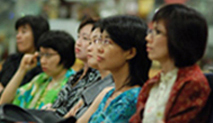Young Children’s Voices in Mathematical Problem Solving
Contributed by Dr Ho Siew Yin and Sng Wei Qin Abbie, from NTUC First Campus, for SingTeach Virtual […]
Read More
Journalling can be an effective “check and balance” for teachers. SingTeach shows you how.
The best tool a teacher can have is experience. While it takes time to build up a body of experience, what we do with them is also important. Journalling is an effective way for teachers to voice their thoughts and revaluate their teaching practices, so as to understand themselves better and be better teachers.
Two programmes at the National Institute of Education currently use journalling as one of the key components of their participants’ learning journey.
 The Leadership in Education Programme (LEP) is a 6-month programme for selected education officers which will prepare them for taking on leadership roles in schools. The second programme, the Management and Leadership in Schools (MLS), lasts 17 weeks and aims to develop middle-level leaders by expanding their roles and taking on direct leadership for teaching and learning for the innovative school.
The Leadership in Education Programme (LEP) is a 6-month programme for selected education officers which will prepare them for taking on leadership roles in schools. The second programme, the Management and Leadership in Schools (MLS), lasts 17 weeks and aims to develop middle-level leaders by expanding their roles and taking on direct leadership for teaching and learning for the innovative school.
Both programmes emphasise the importance of collaborative learning, of which journalling is a key component of the learning process. We speak to Associate Professor and Associate Dean of Leadership Studies, David Ng, to learn more.
 David: Learning takes place through the process of “discovering” knowledge from different experiences including lectures, international visits and journalling.
David: Learning takes place through the process of “discovering” knowledge from different experiences including lectures, international visits and journalling.
A lot of participants will take what was discussed in class and reflect further about their own management practices.
This reflection process presents an opportunity for participants to assess what they are currently doing and challenge their assumptions. Armed with the new knowledge from the class, they are then able to reaffirm their assumptions or refine their practices. This may even lead them to introduce new practices when they go back to school.
For example, when most of us make decisions, we almost never make decisions based on facts alone. A lot of times, it is our values that help us make decisions. In journalling, our participants have the opportunity and time, to clarify their own values.
David: Not everyone likes to write or put their thoughts into words or journals. While journalling is a requirement of the programme, we do understand the diversity in everyone’s abilities, as well as the depth of their reflections. Our role as a tutor is to encourage and offer alternative perspectives. We guide them along in thinking through critical issues as well as encourage them to write.
We have had so many participants who have gone through the programme who encountered problems with the journalling but as they moved along, they realised that they could do it. So we have had no issues from participants regarding the journalling.
David: Make sure that when you write your journal, you don’t defame somebody. If it becomes defamation, you could be sued. Talk about the issue, and not about the person’s character. Write about the challenges, the facts surrounding the situation and how the decision was made or the outcome.
The goal of reflection is not find a solution or answer to the problem. Most of the time, you won’t be able to have an answer or solution immediately. But it helps to put things in perspective by looking at factors and challenges leading to the current situation.
We also encourage teachers to consider their role within the situation. What autonomy or authority do they have to exercise change? Reflect upon this and work within that sphere of authority.
The beauty of journalling is that teachers take charge of their own learning.
Not sure what you should do to get started in journalling? Here are some tips from David:
For more information and tips on journalling, visit Writing and Keeping Journals from the infed.org website.
Reference
Hobson, D. (2000). Action and reflection: Narrative and journaling in teacher research. In G. E. Burnaford, J. Fisher, & D. Hobson (Eds.), Teachers doing research: The power of action through inquiry (pp. 7-28). Hillsdale, NJ: Lawrence Erlbaum.